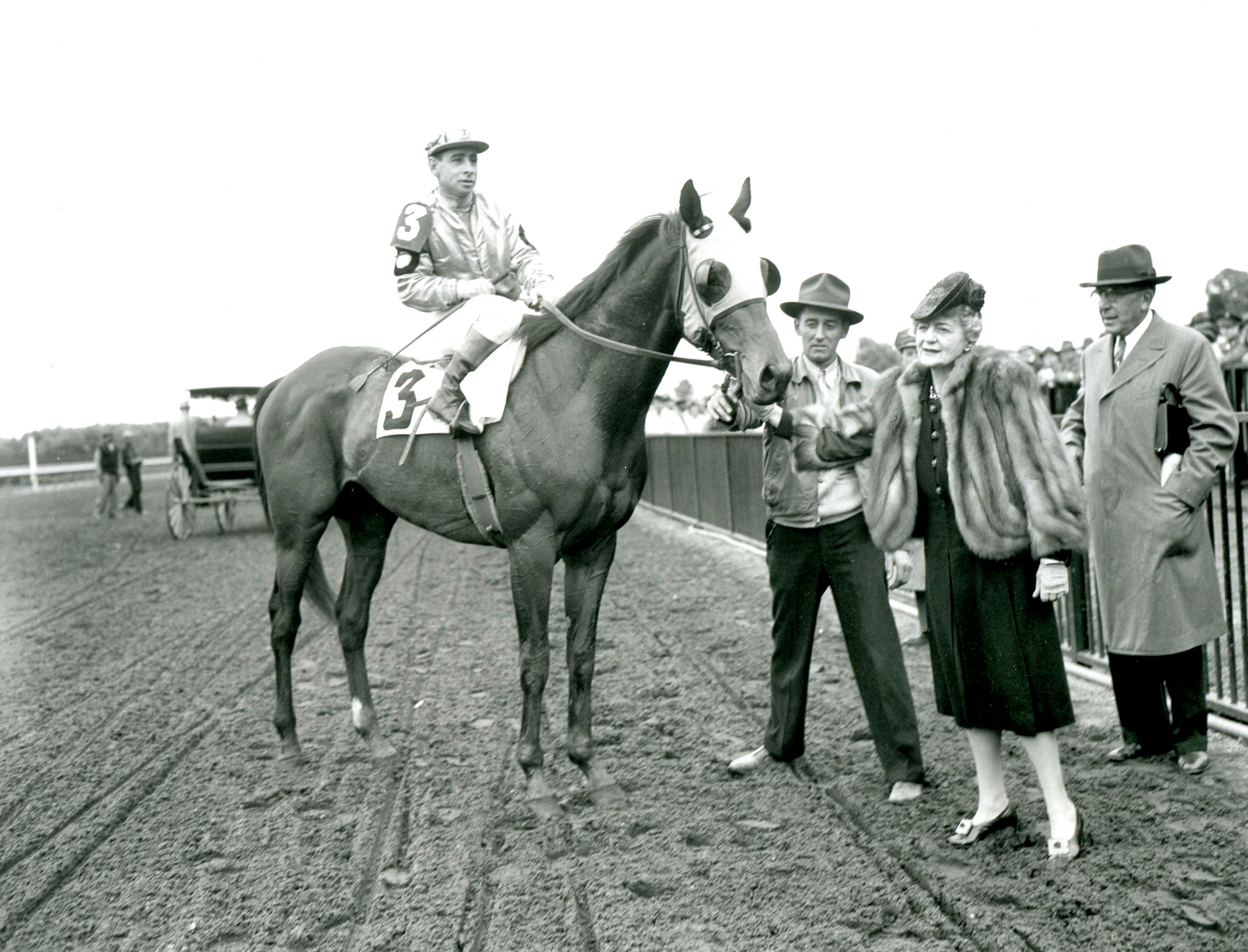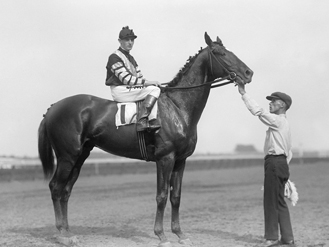Count Fleet: Among the immortals

Eighty years ago, Count Fleet assured his status as an all-time great by sweeping the Triple Crown in dominant fashion
By Brien Bouyea
Hall of Fame and Communications Director
On June 5, 1943, Count Fleet cruised his way to a 25-length victory in the Belmont Stakes to become America’s sixth Triple Crown winner. Eighty years later, the son of Reigh Count retains his status as one of the greatest thoroughbreds in American racing history.
It’s a bit difficult to imagine in retrospect, but Count Fleet wasn’t considered anything special early in his career. In fact, he was so temperamental as a 2-year-old that his owner, John D. Hertz, tried to sell him to anyone who would put up $4,500. Hertz couldn’t find a single taker. Count Fleet’s jockey, the great Johnny Longden, initially thought the horse was a bit small and looked more like a filly than a colt. Longden also didn’t care for Count Fleet’s unruliness, but he was able to eventually see past the horse’s flaws and recognize the considerable raw ability.
“When that leggy brown colt wants to run, he can just about fly,” Longden said in an interview with The BloodHorse.
Hertz, who made a fortune by founding the Yellow Cab Company and later with Hertz Rent a Car, turned Count Fleet over to trainer Don Cameron. Fannie Hertz, John’s wife, was officially listed as the horse’s breeder and owner. Count Fleet was a homebred, as Reigh Count won the Kentucky Derby for Mr. and Mrs. Hertz in 1928.
Count Fleet made his debut at Belmont Park on June 1, 1942, but he struggled with figuring out the starting gate and was left behind at the break by about 50 yards. He showed some of his incredible potential by closing fast to finish second, but it was obvious there were some kinks to be worked out. Two weeks later, at Aqueduct, Count Fleet once again had trouble early in the race and had to rally to finish second. Four days later, he finally broke his maiden at Aqueduct.
Trying stakes company for the first time, Count Fleet was second to Gold Shower in the East View Stakes at Empire City. A week later, he turned the tables on Gold Shower and won his first stake, the Wakefield. The talented colt Occupation got the best of Count Fleet in both the Washington Park Futurity and Belmont Futurity. Count Fleet and his connections were able to get everything figured out in October of 1942.
After his defeat in the Belmont Futurity, Count Fleet never lost another race. He won his final four starts as a juvenile, including the Champagne Stakes (setting a world record for a 2-year-old at a mile of 1:34⅘), Pimlico Futurity (defeating Occupation) and Walden Stakes (by 30 lengths), to close out his season with a record of 10-4-1 from 16 starts and earnings of $76,245. Racing secretary John B. Campbell was so impressed with Count Fleet he assigned him a then-record 132 pounds on the Experimental Free Handicap.
Count Fleet won an allowance to begin his 3-year-old campaign in 1943 and followed with an easy victory in the Wood Memorial. Unfortunately, Count Fleet suffered an injury to the coronet band of his left rear hoof in the Wood that led to speculation he would either skip the Kentucky Derby or not be in top form for the race. On the train trip to Louisville, Longden stayed in the box car with Count Fleet and kept ice on the foot. Once the race began, Count Fleet proved himself to be much the best, winning by three lengths as the 2-5 favorite in the field of 10.
Only three horses bothered to show up for the Preakness a week later and it was obvious they were all running for second. Count Fleet led from start to finish and beat second-place Blue Swords by eight lengths in 1:57⅖, just a second off the track record. Longden never pressed his mount for anything more than what was needed.
With about a month gap between the Preakness and Belmont, Count Fleet stayed sharp with a five-length victory in the Withers at odds of 1-20. The Belmont proved to be even more of a walk in the park for Count Fleet than the Preakness, as only Fairy Manhurst and Desorento entered the gate with to take on the heavy favorite.
They should have stayed home.
Count Fleet delivered a virtuoso performance in the Belmont. His 25-length margin of victory stood as the standard until Secretariat won by 31 lengths 30 years later. Count Fleet’s time of 2:28⅕ set a new stakes record. The news, however, was not all good. Count Fleet twisted an ankle during the race and Hertz decided to retire him with a career record of 16-4-1 from 21 starts and earnings of $250,300, an impressive total for the World War II era. Considering the horse was so stubborn, Hertz did not want to risk further injury.
“I felt him bobble in the stretch and knew he had hurt himself,” Longden said. “I started to pull him up, but he’d have none of it. He just grabbed the bit in that bull-headed way of his and took off again.”
Count Fleet went on to be a phenomenal success as a stallion. He was America’s leading sire in 1951 and was considered so valuable that Lloyd’s of London insured him for a record $550,000. His runners in 1951 included Kentucky Derby winner Count Turf, Horse of the Year Counterpoint and champion 3-year-old filly Kiss Me Kate, among others. In all, Count Fleet sired 38 stakes winners, including another Horse of the Year, One Count. His female offspring produced 119 stakes winners, including five-time Horse of the Year Kelso.
Count Fleet was inducted into the Hall of Fame in 1962 and pensioned from stallion duty four years later. He remained at the place of his birth, Stoner Creek Stud near Paris, Kentucky, until his death at the age of 33 in 1973.
Longden, who also rode the likes of Whirlaway, Swaps, Noor and Majestic Prince, said Count Fleet was his best mount.
“I don't know the great horses like Man o’ War because I wasn't around then, but the Count is the greatest I've ever ridden,” he said. “Got everything, speed, heart — just everything.”
Count Fleet (KY)

Lifespan: 1940 — 1973
Pedigree: Reigh Count—Quickly, by Haste
Breeder: Fannie Hertz
Owner: Fannie Hertz
Trainer: Don Cameron
Career dates: 1942 – 1943
Record: 21 starts, 16 wins, 4 seconds, 1 third
Earnings: $250,300
Notable:
- America's sixth Triple Crown winner 1943
- Champion 2-Year-Old Male 1942
- Horse of the Year 1943
- Champion 3-Year-Old Male 1943
- Leading sire in North America 1951
- Inducted into the Hall of Fame 1962




